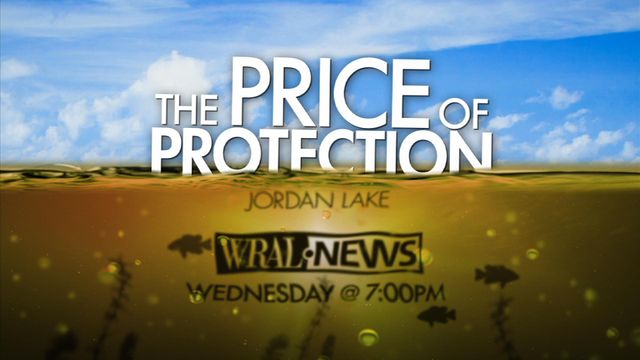The Price of Protection: Who should pay to clean Jordan Lake?
From the beginning, Jordan Lake has struggled with pollution and water quality problems, but lawmakers continue to debate about who should pay to clean the lake.
Posted — UpdatedFrom the beginning, the lake has struggled with pollution and water quality problems, but lawmakers continue to debate about who should pay to clean the lake.
To address the longstanding problem, the General Assembly passed the “Jordan Lake Rules” in 2009 to cut pollution and runoff flowing into the lake from upstream sources by 35 percent. Last month, the state Senate passed a bill that repeals the rules for everyone in the Jordan Lake watershed.
The watershed stretches from the southern part of the lake in Chatham County to the northwest, past cities such as Greensboro and Burlington.
Under existing rules, cities and builders must play by the same rules, no matter how close or far away they are to the lake. The legislation on the table would scrap the environmental protection plan and start work on a new one, but some say that's a reckless approach.
Those who want to keep the existing rules in place argue it's not just about recreational activities on and around the lake; it’s about the drinking water.
“(The lake) has major pollution,” said Jean Campbell, who has a houseboat docked at Jordan Lake’s marina. “If it’s going to get worse in the future, I have major concerns about that.”
A spokesman with the North Carolina Department of Environment and Natural Resources agrees and says the agency does not support the change to the bill. But that's not deterring some lawmakers.
“The problem is, we do not have convincing evidence that says mitigation of the lake upstream is going to have a material effect on the quality of the water at Jordan Lake,” said Sen. Rick Gunn, R-Alamance, who co-authored the new legislation.
Gunn says Alamance County is one of the upstream communities paying a hefty price to protect the lake under the current rules.
“My city right now is finishing a $23 million point-source water discharge system. Greensboro is looking at over $100 million to do the same thing,” he said.
Gunn says the biggest cost to his area is the impact to economic development and job growth.
“The rules literally put all those areas on a non-competitive playing field with the other areas in our state. It is crippling the economic development, and we just don’t think it’s right,” he said.
The fight appears to be as much of a regional one as a partisan one. One of two Democrats who support Gunn's bill represents an area in the Jordan Lake watershed. Sen. Gladys Robinson, D-Guilford, is often outspoken.
“It does nothing across the board for our teachers,” she said.
Despite voting to repeal the rules in its entirety, she had no comment on the Jordan Lake issue. On the flip side, only three Republicans, all of whom represent Wake County, voted against it.
“I thought the environment concerns overrode that necessity to create more jobs in Rick Gunn’s, Sen. Rick Gunn’s area,” said Sen. Neal Hunt, R-Wake. “As a developer, I’ve always been of the opinion that you should have a social conscience.”
Hunt says he understands his colleague’s position but calls it shortsighted. The big concern, he says, is scrapping existing rules with no new plan in place. Gunn says it's necessary to start from scratch.
“If we leave things in place and try to do a study, the default is always to go back to what is on the books,” Gunn said.
• Credits
Copyright 2024 by Capitol Broadcasting Company. All rights reserved. This material may not be published, broadcast, rewritten or redistributed.






